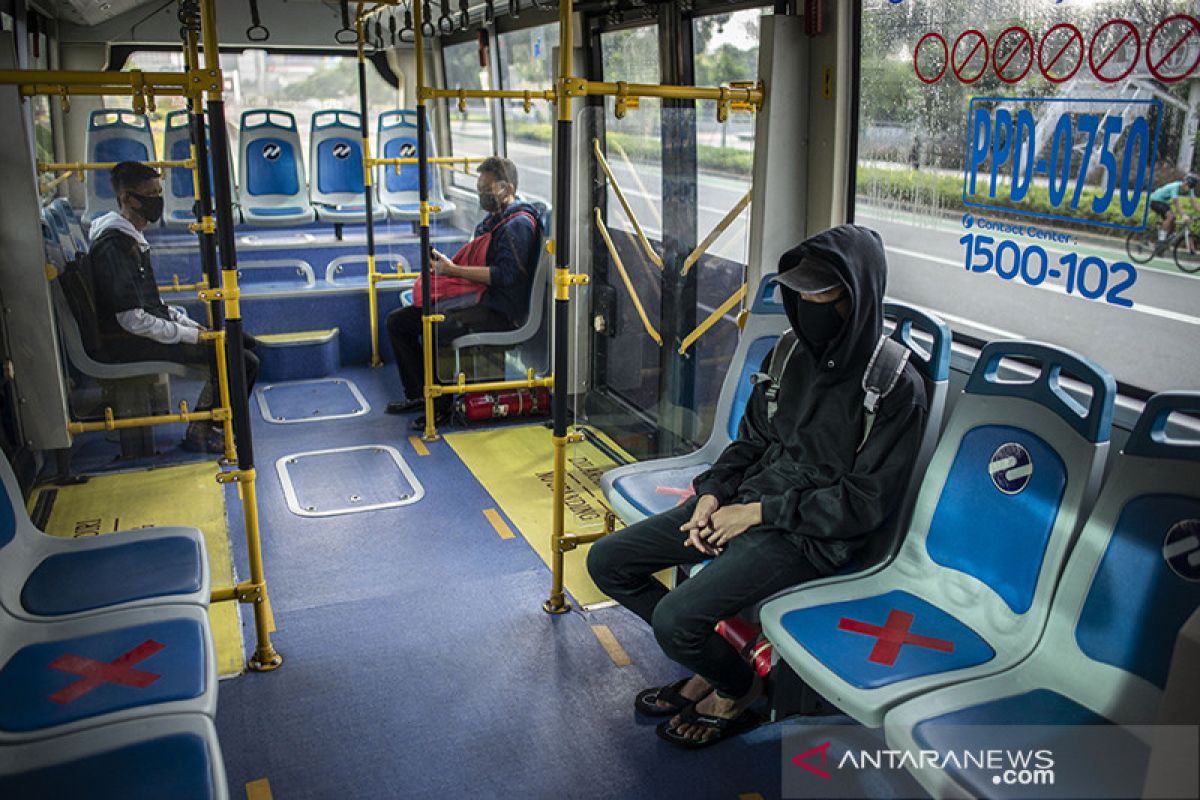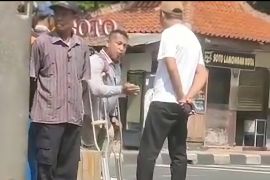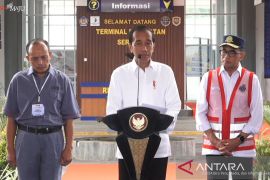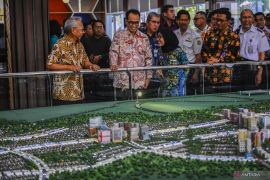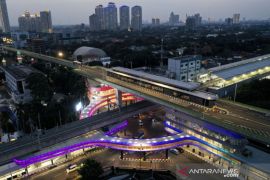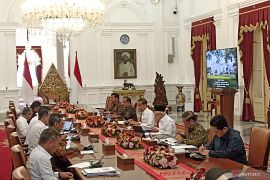Even though such awareness has increased... our people have not gotten used to the new protocols. Thus, the regulator should be bold and impose the punishment for operators who defy the rulesJakarta (ANTARA) -
As the Indonesian government prepares to reopen the economy amid the COVID-19 pandemic, the transportation sector is gearing up to once again take up its essential role of ensuring public mobility, albeit with caution.
Public transportation operators, in Jakarta for instance, are resuming operations ahead of the new normal with several measures in place, one of which is continuing to mark seats that need to be kept vacant with an X.
TransJakarta, MRT, and Commuter Line — the three major public transport services in the greater area of the capital are placing an X sign to help passengers decide where to sit and to encourage physical distancing.
Since the very beginning of the outbreak, the World Health Organization (WHO) has promoted "keep the distance" rule, urging people to maintain a distance of at least one meter from others, besides wearing masks and washing hands regularly, given that the coronavirus is known to transmit through droplets.
Lukas Irawan (25), a private employee, travelled once on Commuter Line's train from Bogor to the downtown area of Jakarta earlier in July this year, after working from home for some time.
"I preferred to not sit, though the seating was alternated and some seats were empty as I took the train during the weekend," Irawan told ANTARA.
"I was feeling insecure, however," he noted, adding that while the temperature check is mandatory before boarding, he still has concerns over infection, and so, he focuses on self-protection.
Irawan dons a mask, wears a jacket as well as a hat, and carries a hand-sanitizer in his pocket.
With employees now allowed back in offices, Irawan said, several health protocols have been implemented at his office, located in Kebayoran Lama area, to prevent the spread of COVID-19, such as the use of disinfectant chambers.
"And all my colleagues who use public transportation to (get to) the office take a shower first (after they arrive, before starting work)," he said.
During his day-to-day activities across the city, Irawan rarely takes public transport as he prefers to use his motorbike. However, this does not mean he is free from concerns over COVID-19.
On July 9, 2020, the WHO updated its document on coronavirus transmission to include the possibility of the infection transmitting through air.
"Hence, every time I go out, ride my motorbike, I am always prepared and I follow the health and safety protocols by donning a mask and using my elbow to press elevator buttons," Irawan said.
Since public transport serves as a focal point in ensuring people's mobility, particularly in this region of more than 10 million citizens, it would be great if the operators provide more transportation units, he added.
The new protocols
Most economic activity has already been allowed and several strict rules have been eased. However, Jakarta has not entered "the new normal" formally.
The provincial government is still enacting the Transition Period of the Large-Scale Social Distancing (PSBB Transisi), which has now been extended twice, each time by two weeks, and is expected to end by July 30, 2020.
Given the situation, TransJakarta said, that it is consistently applying the new protocols, including the most essential: it has made masks mandatory for everyone at stations as well as on buses.
“(We request) Passengers to not have direct or phone conversations while on board," states one TransJakarta's trip advisories, published on its social media account.
The new normal operational hours of its buses are returning to normal (5 a.m. to 10 p.m.) since July 1, 2020, but the limitation on the number of passengers remains.
MRT Jakarta is adopting similar protocols as TransJakarta since both are part of JakLingko, the integrated public transportation system in the city, but are referring to them as Protokol Bangkit (which literally means: revived protocols).
"(The facilities include) marking stickers for passengers' (to help them maintain a) safe distance while queuing, sitting, as well as standing," according to the MRT Jakarta’s official site.
Commuter Line Jakarta has just added rules to the new protocols, making it mandatory to wear long-sleeved shirts. It has also recommended the use of face shields along with masks.
Observer's criticism
Despite the implementation of rules and issuing of guidance, the ground reality is quite different from what it should be, Djoko Setijowarno, an expert on transportation policy, said.
"I, myself, am already using air and sea transport... from those, I can say that different airlines show different levels of health protocol implementation — especially on physical distancing," Setijowarno told ANTARA.
The head of advocacy and social affairs at the Indonesian Transportation Community (MTI) said there is lack of awareness among the passengers and the regulators also do not impose strict rules and penalty on transport operators.
“Even though such awareness has increased... our people have not gotten used to the new protocols," he noted. "Thus, the regulator should be bold and impose the punishment for operators who defy the rules,” he added.
Furthermore, he remarked, the pandemic should serve as an opportunity for local governments to open their eyes and improve the public transportation system--not only in the capital, but also remote provinces and cities across Indonesia to provide better facilities for their people.
"I think Colombia's Bogota might be a good model (for local governments to emulate), as the country is also a developing (nation) as (is) Indonesia, and the local leaders have continuously voiced their commitment to build their public transport system," Setijowarno said, referring to the city's transportation system before the pandemic.
Related news: Restaurants in Jakarta reopen doors with caution
Related news: Places of worship adapt to new normal, strive for safety
Related News: Implementing health protocols in wet markets remains challenging
Editor: Gusti Nur Cahya Aryani
Copyright © ANTARA 2020
